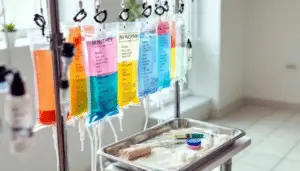Treatment-resistant depression (TRD) is a serious mental health condition that affects millions of people who don’t respond to standard antidepressant therapy. While initial treatments like oral antidepressants, talk therapy, and lifestyle changes can be effective for many, a significant number of patients continue to experience major depressive episodesand persistent symptoms.
If you or someone you love is struggling with resistant depression, there is hope. Advances in medicine and psychology have introduced a range of effective treatment options designed specifically for those with treatment-resistant depression. This article breaks down the top therapies available, the science behind them, and how PointHealth can support your recovery journey.
What Is Treatment-Resistant Depression?
Treatment-resistant depression is typically defined as major depression that does not improve after trying at least two different antidepressant medications at adequate doses and duration. Many patients experience persistent depressive symptoms even after multiple rounds of treatment.
Common Symptoms of TRD:
-
Ongoing depressed mood
-
Fatigue and loss of interest in activities
-
Feelings of hopelessness
-
Difficulty concentrating
-
Sleep issues
-
Suicidal ideation
The cause of TRD is often complex, involving brain chemistry, genetics, underlying physical health conditions, or psychological and environmental factors.
Top Treatments for Treatment-Resistant Depression
The following therapies have shown promising results in clinical trials and are used in leading mental health clinics across the country:
1. Electroconvulsive Therapy (ECT)
ECT remains one of the most effective treatments for severe depression, especially when rapid relief is needed. It uses electrical currents to stimulate brain cells and reset abnormal activity.
-
Used in major depressive disorder with suicidal ideation
-
Usually delivered in a hospital setting
-
Side effects may include short-term memory loss
2. Repetitive Transcranial Magnetic Stimulation (rTMS)
This FDA-approved non-invasive procedure uses magnetic fields to stimulate nerve cells in the brain. rTMS has shown success in relieving depression when other treatments fail.
-
Targets areas of the brain involved in mood regulation
-
Typically administered 5 days/week for several weeks
-
Few side effects compared to medications
3. Vagus Nerve Stimulation (VNS)
A device is implanted in the chest to stimulate the vagus nerve, which influences brain function. VNS has helped patients suffering from chronic depressive disorders.
-
Used after failure of multiple antidepressant treatments
-
May improve continuation treatment outcomes
4. Ketamine and Esketamine Nasal Spray
Originally used as an anesthetic, ketamine and its derivative esketamine are powerful alternatives for treating TRD. Administered via IV infusion or nasal spray, these treatments work rapidly to improve symptoms.
-
Works differently from traditional antidepressants
-
Can reduce symptoms within hours
-
Administered in a medical setting due to possible side effects
5. Adjunctive Treatments and Augmentation
Sometimes adding other medications or thyroid hormone to existing antidepressant therapy can enhance outcomes. For example:
-
Second treatment approaches may include mood stabilizers, antipsychotics, or tricyclic antidepressants
-
Used when there’s partial response to a current antidepressant
6. Deep Brain Stimulation (DBS)
DBS is an investigational treatment involving the implantation of electrodes in specific brain regions. Though still under research, evidence suggests DBS may help stimulate nerve cells to relieve symptoms in depressed patients.
7. Mindfulness-Based Cognitive Therapy (MBCT) and Interpersonal Psychotherapy
For those who don’t respond to medications alone, structured talk therapies like MBCT can offer relief. MBCT integrates cognitive behavioral therapy (CBT) with mindfulness to prevent relapse.
-
Helps patients with recurrent depressive episodes
-
Improves emotional regulation and coping strategies
8. Lifestyle and Behavioral Activation
Incorporating physical activity, healthy routines, and behavioral goals is crucial. Exercise, in particular, has been linked to significant improvements in mood disorders.
-
Promotes neurogenesis and stress reduction
-
Helps manage depression symptoms alongside other treatments
Risk Factors for Treatment-Resistant Depression
Certain conditions can increase the likelihood of TRD:
-
Thyroid disease
-
Chronic medical conditions
-
Family history of depressive disorders
-
Early age of onset
-
History of trauma or substance use
-
Longstanding mental health conditions
PointHealth’s Role in Supporting TRD Patients
PointHealth offers a powerful complement to traditional mental health treatments by providing cutting-edge therapiesand supportive care for those experiencing treatment-resistant depression. Our services include:
-
Ketamine IV infusions for fast-acting relief
-
rTMS (Repetitive Transcranial Magnetic Stimulation) with expert oversight
-
Holistic support including nutritional IV therapy, mindfulness guidance, and more
-
Collaborative care with your existing therapist or psychiatrist
We understand that many patients feel discouraged when multiple treatments fail. Our mission is to help you regain hope, find the right combination of therapies, and improve your overall quality of life.
Book an Appointment with PointHealth Today
If you or someone you love is dealing with treatment-resistant depression, it’s time to explore all your options. Don’t lose hope—effective help is available.
📞 Call (855) 263-1487 or visit www.pointhealthclinic.com to book your appointment now.
Our board-certified providers are here to guide you toward relief, recovery, and renewed mental wellness.
Final Thoughts
Resistant depression can feel overwhelming, but you are not alone. With the rise of brain stimulation therapies, alternative medications, and adjunctive treatments, today’s landscape of depression treatment offers more tools than ever before.
From electroconvulsive therapy (ECT) and vagus nerve stimulation to psychedelic compound-based research, science continues to explore breakthrough solutions for patients who need them most. Talk to your care team—and consider PointHealth as part of your comprehensive plan to overcome depression.

